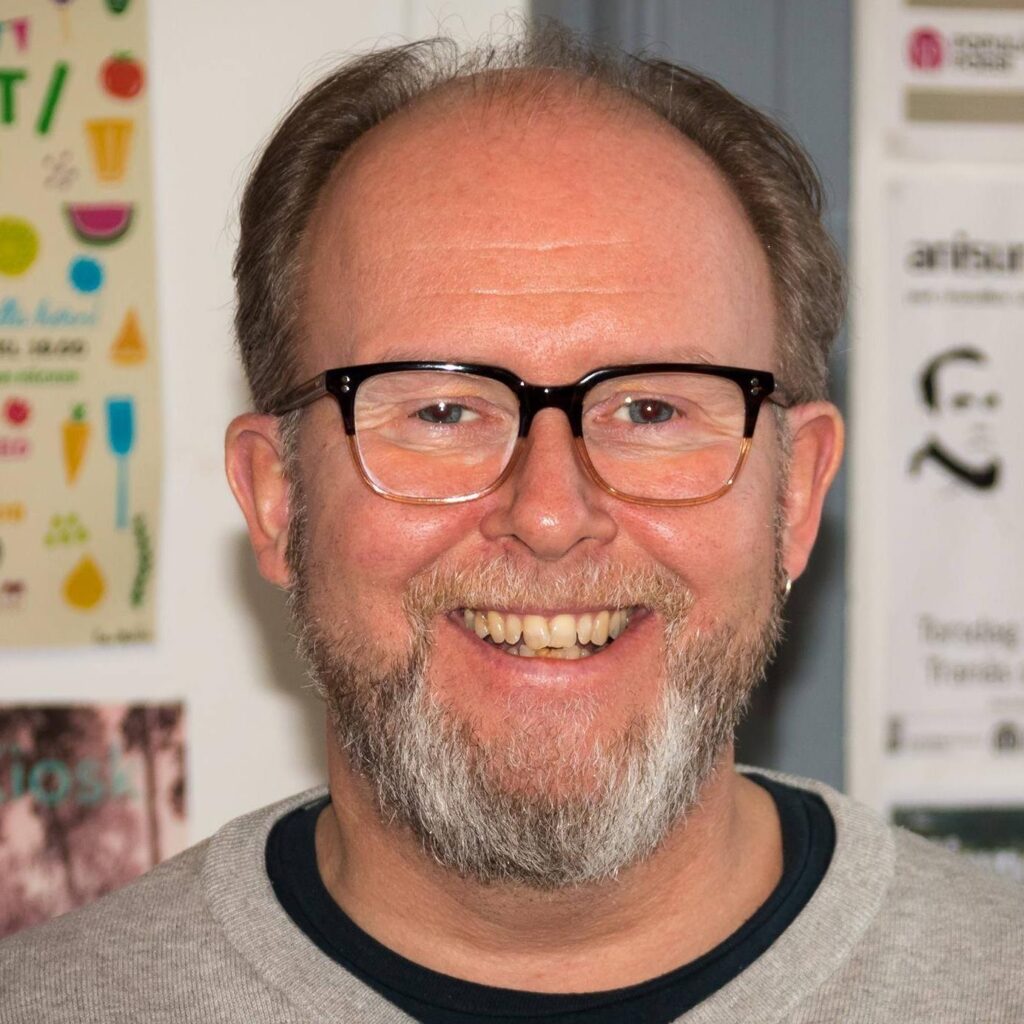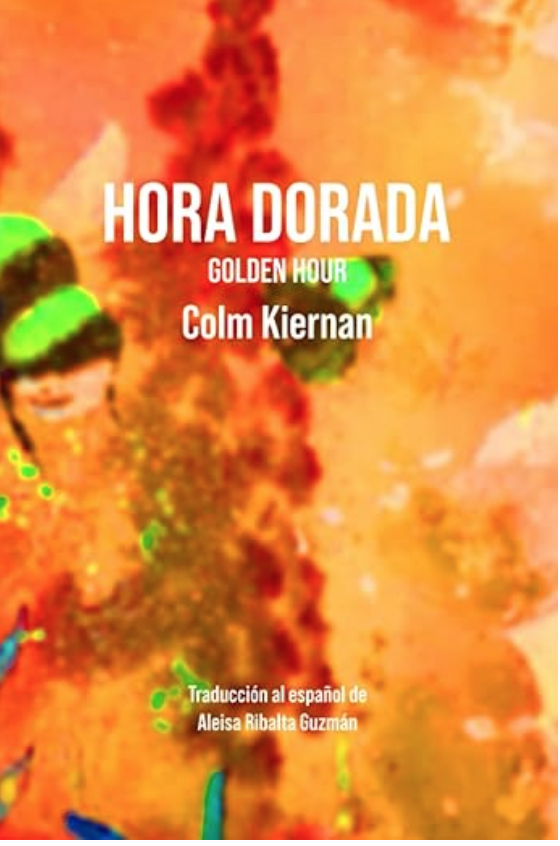Colm Kiernan: Hora Dorada, contarnos los intersticios del ser, lo universal.

Colm Kiernain es un trabajador cultural nacido en Irlanda y residente en Suecia. Le gusta usar sus emociones para representar imágenes con palabras. Se dio cuenta temprano en la vida de que no importaba cuánto hablara sobre un tema, las palabras no tenían el poder de transmitir sus sentimientos, ya que las estructuras lógicas las obstaculizaban. Encuentra que las palabras, cuando se usan en poesía, dibujan entre líneas. Fluyendo más allá de los confines del realismo y la lógica hacia el yo desnudo. Una desnudez del alma inconcebible excepto en la esperanza de un poema. Su poesía define su yo interior.
Con estas palabras se define el poeta y así, no solo escoge el camino, también nos deja claro por dónde ha elegido caminar, ya clara la ruta y no tan claro el destino. Y mientras le leemos nos preguntamos, perplejos, ¿hacia dónde es el viaje?. Si todo el recorrido es hacia dentro, la meta es descubrir y también: descubrirnos, mostrar y un poco: demostrarnos. Algo tal vez demasiado duro, un sarcasmo que el lector enfrenta perturbado. Muchas veces es la realidad la que lleva máscara, la que se esconde. Entonces, el cuchillo es el poeta. Nos consternamos con el sello que distingue a su poesía, una incisiva crítica social porque la realidad, más que hablarnos, se defiende cauta. Aquí el yo, que nunca calla, no tiene la más mínima piedad para contarnos los intersticios del ser, lo universal. Aunque para ello, como decía Roque Dalton, sea necesario un mínimo gesto, algo parecido a la melancolía.
La poesía de Colm Kiernan es tierna y es violenta, es dura y es bella. Tiene a veces la frescura de un adolescente que se enfrenta al mundo y también, por eso, el descarnado gesto del que desvela, lo saca todo de las mismas entrañas y lo expone, tal cual, al lector. Es la poesía del que ha vivido, sabemos que es algo natural ese proceso. Colm empezó a escribir desde muy joven y esos poemas se fueron madurando con su propio autor. No hay hasta el momento libro suyo publicado, como una voluntad del poeta de no permanecer, de seguir rodando con sus versos. Los escribe en su teléfono, a veces ciertamente caminando, y así los va almacenando, editando, construyendo un cuerpo. El cuerpo poético que a veces sangra, se descompone, también florece, retoña y como todo cuerpo vivo, se regenera.
No espera el poeta que el lector coincida con él pero le deja claro que la realidad no será aquí disfrazada, maquillada solo con palabras. Ni el amor, ni el desamor son inocentes, tampoco la muerte. Aunque necesarios y bellos, todo duele, todo adolece, todo apremia… En las entrañas mismas del poema se retuerce el verso, que busca su cauce como el río su camino al mar. Como lo hace el amor, sin compasión. Así como la muerte, como la pérdida de ese lugar donde nacimos y al que no volveremos. Como la soledad del que está vivo y escribe.
Colm Kiernan is a cultural worker originally from Ireland but now living in Sweden. He likes to use his emotions to paint pictures with words. He realised early in life that no matter how much he talked around a subject words didn’t have the power to convey his feelings, being hampered by logical structures. He finds that words when used in poetry for him paint between the lines. Flowing beyond the confines of realism and logic to bare self. A nudity of the soul inconceivable except in the hope of a poem. His poetry defines his inner self.
With these powerful and naked verses that appear behind the veils of an ordinary morning, the poet defines himself and thus, not only chooses a path, but also makes it clear to us how he has chosen to walk. The route is definite but the destination not so. As we read, we ask ourselves, perplexed, where is the journey to? If the whole journey is inward, the goal is for the poet to discover himself and to show us a little of how to discover ourselves. The sarcasm is maybe sometime too harsh, leaving the reader disturbed, but often it is reality that wears the mask, reality is hidden. Then, the poet becomes a knife. We may be dismayed by the stamp that marks his poetry, an incisive social criticism, because reality, rather than speaking to us, cautiously defends itself. Here the «I», which is never silent, does not have the slightest hesitation in telling us about the interstices of being, the universal. Although this, as Roque Dalton said, is necessary «a minimum gesture, something similar to melancholy».
Colm Kiernan’s poetry is tender and powerful, hard and beautiful. It has at times the simplicity of a teenager facing the world and also, therefore, the bone-picking of the one who lays it all bare, rips out the guts and exposes it, as it is, to the reader. However, it is the poetry of one who has lived and we know that there has been a natural process. Colm began writing at a very young age and his poems have matured with the author himself. This is the first book of his poetry to be published, suggesting the will of the poet not to be captured, but to keep reworking his lines. He writes them on his phone, often while walking, and so he stores them, editing them, building a body. A poetic corpus that sometimes bleeds and decomposes, but also blooms and sprouts and, like all living bodies, regenerates itself.
The poet does not expect the reader to agree with him, but he makes it clear that his reality will not be compromised, disguised or embellished with empty words. Neither love nor heartbreak are innocent, nor is death. Although necessary and beautiful, everything hurts, everything hurts, everything hurts, everything is urgent… In the very bowels of the poem the verse twists seeking its channel, like the river, its way to the sea. As does love, without compassion. Like death, like the loss of that place where we were born and to which we will not return. Like the loneliness of the one who is still alive and writes here.


